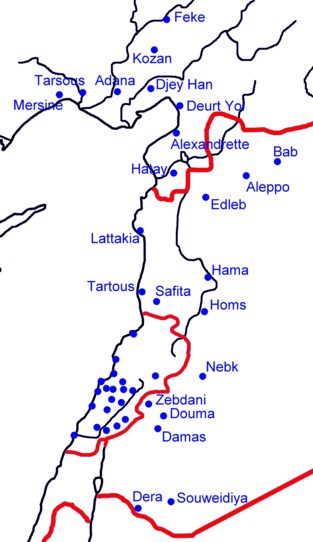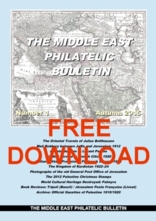The Postal Situation (1917-1948) | |||||
|
Until the establishment of the civil administration all postal services were provided by Allied Field Post Offices of the Egyptian and Indian Expeditionary Forces (EEF and IEF). Where necessary stamps of the home countries were used. Initially all basic services (also for the civilian population) are provided free of postage. Additional services (registered mail, parcels, &c.) had to be paid using British or Indian stamps. This period ended on 10.02.1918 for overseas mail, and six days later also for the interior (ie. all occupied territories incl. Egypt).
| |||||
|
The postage rate for a letter to an overseas destination was set to 1 Egyptian Piaster per 20g weight. The interior rate was set at 5 Millièmes. The military administration (EEF OETA = Egyptian Expeditionary Force Occupied Enemy Territory Administration) issues stamps in time for the end of the postage-free period: initially only one stamp with a value of 1 Piaster, then a makeshift overprint for 5 Millièmes: The Provisionals 1918 (Blues). In July 1918 a regular set of definitives (values from 1m to 20p) is issued: The Definitives 1918 (Typos). Both issues are valid in the entire occupied territories: apart from Palestine also on the Sinai, in Transjordan, Syria, Lebanon and Cilicia. Post marks of these areas may range in value. A summary list of Palestinian and non-Palestinian postal offices and their post marks may be of use. |

Usage of EEF-stamps outside Palestine | ||||
|
After the separation of Transjordan the EEF stamps had to be localized by the newly established civil administration. Six different overprint issues are used between September 1920 and June 1927:
Stamps from the Pictorials issue were also used to produce Coils and Booklets. Three sets of Postage Due stamp were also issued: |
|
At the beginning of 1948 the British mandate authorities could no longer maintain full postal services. Initial plans to transfer the postal administration to the United Nations failed. On 25.02.1948 the UPU was officially told that postal services would cease by 15.05.1948. The PTTP Postmaster General announced on 13.04.1948 (Circular no. 53) a plan to close-down all services in steps starting from 15.04.1948. In many instances this plan could not be adhered-to and postal angencies and offices had to close at earlier dates. The two last offices open for business (Haifa and Tel Aviv) closed on 5.05.1948. |
